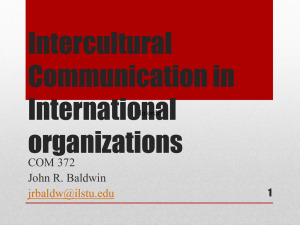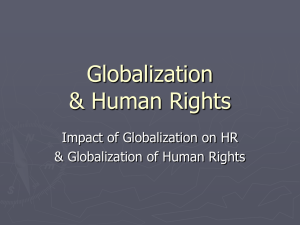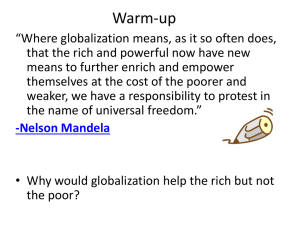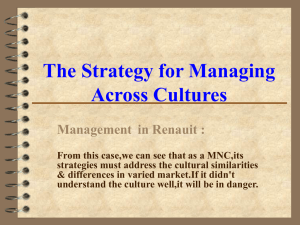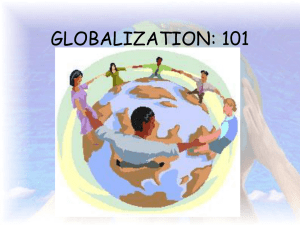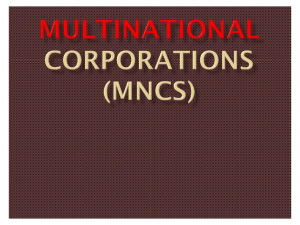File - student business information
advertisement
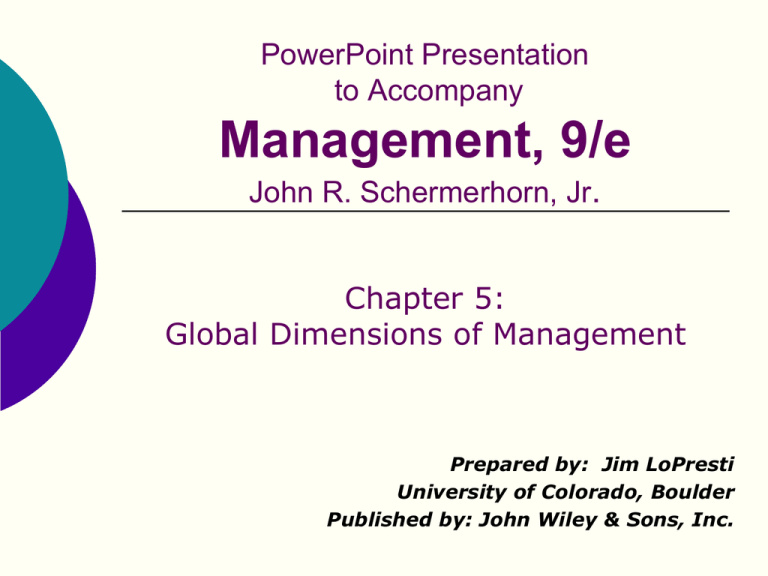
PowerPoint Presentation to Accompany Management, 9/e John R. Schermerhorn, Jr. Chapter 5: Global Dimensions of Management Prepared by: Jim LoPresti University of Colorado, Boulder Published by: John Wiley & Sons, Inc. Study Question 1: What are the international business challenges of globalization? Key concepts in the challenges of globalization: Global economy Globalization International management Global manager Management 9/e - Chapter 5 2 Study Question 1: What are the international business challenges of globalization? Global economy Resource supplies, product markets, and business competition are worldwide, rather than local Globalization The process of growing interdependence of these components in the global economy Management 9/e - Chapter 5 3 Study Question 1: What are the international business challenges of globalization? International management Management in organizations with business interests in more than one country Global manager Informed about international developments Transnational in outlook Competent in working with multicultural people Aware of regional developments in a changing world Management 9/e - Chapter 5 4 Study Question 1: What are the international business challenges of globalization? International businesses Conduct for-profit transactions of goods and services across national boundaries Reasons why businesses go international: Profits Customers Suppliers Capital Labor Management 9/e - Chapter 5 5 Study Question 1 What are the international business challenges of globalization? Market entry strategies involve the sale of goods or services to foreign markets but do not require expensive investments. Types of market entry strategies: Global sourcing Exporting Importing Licensing agreement Franchising Management 9/e - Chapter 5 6 Figure 5.1 Common forms of international business—from market entry to direct investment strategies. Management 9/e - Chapter 5 7 Study Question 1 What are the international business challenges of globalization? Direct investment strategies require major capital commitments but create rights of ownership and control over foreign operations. Types of direct investment strategies: Joint ventures Foreign subsidiaries Management 9/e - Chapter 5 8 Study Question 1 What are the international business challenges of globalization? Criteria for choosing a joint venture partner: Familiarity with your firm’s major business. Strong local workforce. Future expansion possibilities. Strong local market for partner’s own products. Good profit potential. Sound financial standing. Management 9/e - Chapter 5 9 Study Question 1 What are the international business challenges of globalization? Complications in the global business environment: Environment is complex, dynamic, and highly competitive. Global business executives must deal with differences in the environment of business in different countries. World Trade Organization resolves trade and tariff disputes among countries. Protectionism can complicate global trading relationships. Management 9/e - Chapter 5 10 Study Question 2: What are multinational corporations and what do they do? A multinational corporation (MNC) is a business with extensive international operations in more than one foreign country. Management 9/e - Chapter 5 11 Study Question 2: What are multinational corporations and what do they do? Mutual benefits for host country and MNC: Shared growth opportunities Shared income opportunities Shared learning opportunities Shared development opportunities Management 9/e - Chapter 5 12 Study Question 2: What are multinational corporations and what do they do? Host country complaints about MNCs: Excessive profits Domination of local economy Interference with local government Hiring the best local talent Limited technology transfer Disrespect for local customs Management 9/e - Chapter 5 13 Study Question 2: What are multinational corporations and what do they do? MNC complaints about host countries: Profit limitations Overpriced resources Exploitative rules Foreign exchange restrictions Failure to uphold contracts Management 9/e - Chapter 5 14 Study Question 3: What is culture and how does it relate to global diversity? Culture The shared set of beliefs, values, and patterns of behavior common to a group of people. Culture shock Cultural intelligence Confusion and discomfort a person experiences in an unfamiliar culture. The ability to adapt and adjust to new cultures Ethnocentrism Tendency to consider one’s own culture as superior to others. Management 9/e - Chapter 5 15 Study Question 3: What is culture and how does it relate to global diversity? Stages in adjusting to a new culture: Confusion Small victories The honeymoon Irritation and anger Reality Management 9/e - Chapter 5 16 Study Question 3: What is culture and how does it relate to global diversity? Popular dimensions of culture: Language Interpersonal space Time orientation Low-context cultures and high-context cultures Monochronic cultures and polychronic cultures Religion Contracts and agreements Management 9/e - Chapter 5 17 Study Question 3: What is culture and how does it relate to global diversity? Values and national cultures (Hofstede): Power distance Uncertainty avoidance Individualism-collectivism Masculinity-femininity Time orientation Management 9/e - Chapter 5 18 Study Question 4: How do management practices transfer across cultures? Comparative management How management systematically differs among countries and/or cultures. Global managers Need to successfully apply management functions across international boundaries. Management 9/e - Chapter 5 19 Study Question 4: How do management practices transfer across cultures? Are management theories universal? U.S. management theories may be ethnocentric. Participation and individual performance are not emphasized as much in other cultures. Not all Japanese management practices can be applied successfully abroad. Management 9/e - Chapter 5 20 Study Question 4: How do management practices transfer across cultures? Global organizational learning: Companies can and should learn from each other. Readiness for global organizational learning varies based on managerial attitudes. Ethnocentric attitudes Polycentric attitudes Geocentric attitudes Be alert, open, inquiring, but always cautious. Management 9/e - Chapter 5 21


